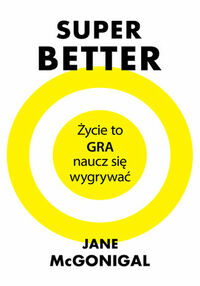Take a photo of a barcode or cover
adventurous
funny
hopeful
informative
inspiring
medium-paced
Can gaming change your life for the better? This book would argue very much that it can. The author has conducted multiple studies, some with people in real life and even more anecdotal stories that have come in from the people who have played online.
It is definitely an interesting read and whether or not I agree that some of these methods are actually "gamified" versus using something wholesale and then slapping a gaming label on it. According to the author, this method has helped thousands of people and I could how that might help people make the changes that they need.
It is definitely an interesting read and whether or not I agree that some of these methods are actually "gamified" versus using something wholesale and then slapping a gaming label on it. According to the author, this method has helped thousands of people and I could how that might help people make the changes that they need.
I liked this book.
It basically using Gamification principles to acheiving Goals.
You pick a goal, you want to achieve, work out what that looks like "An Epic Win", work out what is going to stop you "Bad Guys", what small daily actions you can take to achieve the goal "quests", identify something you can do that will remind you that achieving the goal will make you happier "power ups" and ask someone to check on you or help you with the process "allies".
Then everyday you do three power ups, battle one bad guy and do one quests.
I did originally listen to the audiobook, but I the read the kindle book as the book is full of exercises and has a lot of information to process, which makes it difficult just to listen to the book.
It basically using Gamification principles to acheiving Goals.
You pick a goal, you want to achieve, work out what that looks like "An Epic Win", work out what is going to stop you "Bad Guys", what small daily actions you can take to achieve the goal "quests", identify something you can do that will remind you that achieving the goal will make you happier "power ups" and ask someone to check on you or help you with the process "allies".
Then everyday you do three power ups, battle one bad guy and do one quests.
I did originally listen to the audiobook, but I the read the kindle book as the book is full of exercises and has a lot of information to process, which makes it difficult just to listen to the book.
Read the full review here: http://newberyandbeyond.com/nonfiction-roundup-july-2018/
This book has inspired a sea change of revelation and personal growth. I am better for reading it. You will be, too.
I really enjoyed this book for a couple of reasons. First of all, the idea of the SuperBetter game to accomplish challenges in your life sounds right up my alley. I've already joined the website and added the app to my phone. I'm sure I'll report out on that aspect of it soon.
But the part of this book that I really enjoyed was the science part at the beginning. I loved learning about all the ways people have tested and used gaming psychology in various areas to help people and relationships. I could totally see myself doing a dissertation on this some day - it was that interesting. I'm looking forward to checking out more information on that topic already.
So yeah - if you're interested in psychology, gaming, or finding creative ways to deal with challenges in your life, this book is most definitely for you. And even if you're not, you might find something interesting here.
But the part of this book that I really enjoyed was the science part at the beginning. I loved learning about all the ways people have tested and used gaming psychology in various areas to help people and relationships. I could totally see myself doing a dissertation on this some day - it was that interesting. I'm looking forward to checking out more information on that topic already.
So yeah - if you're interested in psychology, gaming, or finding creative ways to deal with challenges in your life, this book is most definitely for you. And even if you're not, you might find something interesting here.
The concept is great, but I didn't really get into this book. Lots of quests, many of them banal.
Jane McGonigal did have some interesting facts about game playing. She described how playing Tetris for ten minutes within six hours of suffering a trauma reduces PTSD (Post-traumatic stress disorder), as hundreds of studies have proven. Playing the game does not erase the memory, but helps to stop involuntary memory, preventing flashbacks.
She describes how video games can help control cravings. You can control your thoughts and cravings by fully absorbing the visual processing center of the brain, and give pleasurable neuro-mechanical rewards. Also, falling in love can dampen cravings for food, alcohol, and drugs, as was discovered through fMRI's.
Hand-held video games can help reduce children's anxiety before surgery. Other distractions, such as music, comic books and cartoons don't work as well because of the lower level of cognitive absorption. Games and play are the "quintessential flow activity." McGonigal also mentions that mindfulness meditation has similar benefits to casual game play.
McGonigal is clearly an advocate of certain video games. Playing video games is good when they are viewed as a challenge, but bad when they are used as an escape mechanism. She describes how playing Farmville literally saved a marriage!
McGonigal also takes on the subject of violent video games. She writes that aggression associated with violent games is actually related to feelings of incompetence after losing. But this only occurs when playing alone or with strangers. When people play against others in the same physical space, it decreases aggression and hostility, and increases empathy.
So, while I enjoyed reading about McGonigal's philosophy of game-playing, I didn't really get hooked on using quests in everyday life. But this is a personal thing--perhaps others will get hooked more than me.
Jane McGonigal did have some interesting facts about game playing. She described how playing Tetris for ten minutes within six hours of suffering a trauma reduces PTSD (Post-traumatic stress disorder), as hundreds of studies have proven. Playing the game does not erase the memory, but helps to stop involuntary memory, preventing flashbacks.
She describes how video games can help control cravings. You can control your thoughts and cravings by fully absorbing the visual processing center of the brain, and give pleasurable neuro-mechanical rewards. Also, falling in love can dampen cravings for food, alcohol, and drugs, as was discovered through fMRI's.
Hand-held video games can help reduce children's anxiety before surgery. Other distractions, such as music, comic books and cartoons don't work as well because of the lower level of cognitive absorption. Games and play are the "quintessential flow activity." McGonigal also mentions that mindfulness meditation has similar benefits to casual game play.
McGonigal is clearly an advocate of certain video games. Playing video games is good when they are viewed as a challenge, but bad when they are used as an escape mechanism. She describes how playing Farmville literally saved a marriage!
McGonigal also takes on the subject of violent video games. She writes that aggression associated with violent games is actually related to feelings of incompetence after losing. But this only occurs when playing alone or with strangers. When people play against others in the same physical space, it decreases aggression and hostility, and increases empathy.
So, while I enjoyed reading about McGonigal's philosophy of game-playing, I didn't really get hooked on using quests in everyday life. But this is a personal thing--perhaps others will get hooked more than me.
When I picked this up, I didn't realize it was a self-help book. I was interested in how gaming can be harnessed to improve daily life, and the book is definitely full of interesting information (all backed by reputable scientific studies) about how various aspects of gaming can improve one's mental state. The book describes a self-help regimen, which is basically a game called SuperBetter, that lets you gamify real life to improve your resilience, happiness, and general mental well-being. Whether you play SuperBetter or not, the science behind it is really fascinating, and the book is full of interesting information.
This was recommended to me, and I found it a really interesting novel, and I definitely have thought about things a lot differently after reading it.
This book is great for anyone who wants to improve after something has happened in their lives or if they simply want to improve upon themselves. The author has lots to offer in this book.
This book is great for anyone who wants to improve after something has happened in their lives or if they simply want to improve upon themselves. The author has lots to offer in this book.


